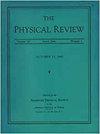Analysis of loss correction with the Gottesman-Kitaev-Preskill code
引用次数: 1
Abstract
The Gottesman-Kitaev-Preskill (GKP) code is a promising bosonic quantum error-correcting code, encoding logical qubits into a bosonic mode in such a way that many physically relevant noise types can be corrected effectively. A particularly relevant noise channel is the pure loss channel, which the GKP code is known to protect against. In particular, it is commonly pointed out that losses can be corrected by the GKP code by transforming the losses into random Gaussian displacements through a quantum-limited amplification channel. However, implementing such amplification in practice is not ideal and could easily introduce an additional overhead of noise from associated experimental imperfections. Here, we analyze the performance of teleportation-based GKP error correction against loss in the absence of an amplification channel. We show that amplification is not required to perform GKP error correction and that performing amplification actually worsens the performance for practically relevant parameter regimes.Gottesman-Kitaev-Preskill码的损耗校正分析
Gottesman-Kitaev-Preskill (GKP)码是一种很有前途的玻色子量子纠错码,它将逻辑量子比特编码成玻色子模式,从而可以有效地纠正许多物理上相关的噪声类型。一个特别相关的噪声信道是纯损耗信道,这是GKP代码所保护的。特别是,通常指出损耗可以通过GKP码通过量子限制放大通道将损耗转换为随机高斯位移来校正。然而,在实践中实现这样的放大是不理想的,并且可以很容易地引入额外的开销噪声从相关的实验缺陷。在这里,我们分析了在没有放大信道的情况下,基于隐形传态的GKP纠错的性能。我们表明,执行GKP误差校正不需要放大,并且执行放大实际上会使实际相关参数制度的性能恶化。
本文章由计算机程序翻译,如有差异,请以英文原文为准。
求助全文
约1分钟内获得全文
求助全文

 求助内容:
求助内容: 应助结果提醒方式:
应助结果提醒方式:


